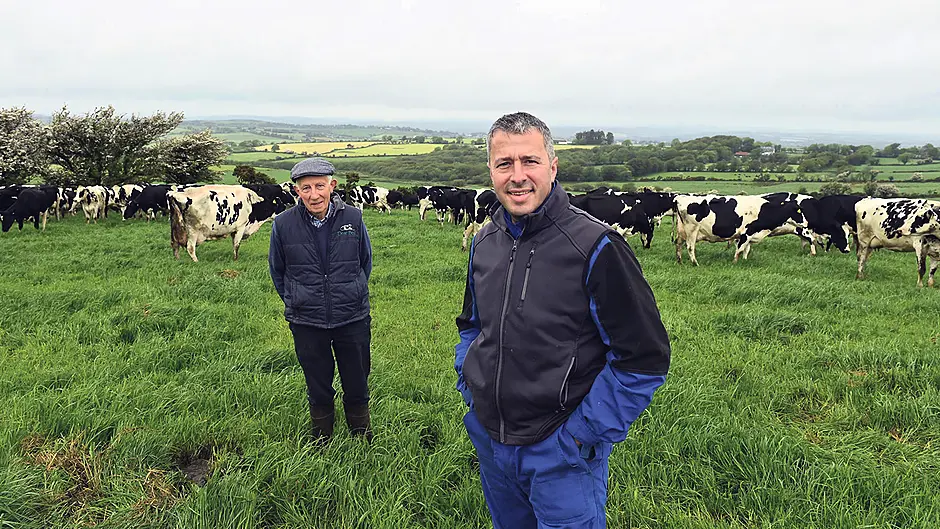In the final of our profiles on Carbery’s sustainability winners for 2020, we profile Ballinascarthy farmer Eddie O’Flynn
EDDIE O’Flynn has been full time dairy farming for 24 years, on his family farm at Tullymurrihy, Ballinascarthy. Eddie’s father purchased the farm in 1970, and after reclaiming land and renewing the farm, he has been dairy farming since 1975. Eddie is a Lisavaird Co-op supplier, has an Honours degree in Business Management from Cork Institute of Technology and is the current chair of Ballinascarthy IFA.
The farm is 138 acres, with a herd of 120 cows, each producing approximately 9,955 litres and 724 kg of milk solids annually. Eddie’s is a pedigree herd, and their focus right the way through since the seventies has been on production and confirming. As Eddie describes, he focuses on getting the most production out of each cow and allowing them to live long enough and in good enough conditions to produce the big amounts of milk.
He adds: ‘To give an example, we have one cow here, Ryefarm DewDrop 341, who, in her fourth lactation, produced 22,334 litres of milk, 1859kg of solids. We achieve this through genetics and management, how we treat our cows over time and how we take care of them.’
Eddie’s farming philosophy generally is less cows who produce more individually, rather than more cows producing half that amount. He measures and records to confirm what the farm can produce and so he can put some science behind what he has understood instinctively himself.
‘We have been milk recording for 40 years, and since the start of 2019 I have been measuring grass – last year we grew over 13.5 tonnes of dry matter.’
His approach on farming sustainably comes down to three pillars; people, profit and planet, and in his view, one cannot exist without the other two.
‘I focus on being sustainable in a number of ways – I use my land efficiently, I take care of what was handed down to me, especially the soil. We aerate the soil and I use organic fertiliser that increases soil biodiversity including worm activity. We’ve used solar here since 2013 for heating water, and I have some wild habitats here and hope to have more.’
It’s important too to Eddie to conserve the heritage of his land. ‘The previous owner of this farm was Mick the Poet, Mick Flynn, a man known locally for capturing many of the happenings of the era in his poems, plays and songs. His house still exists in our farmyard and I also have pillars and other nice features that date from his time that we are trying to preserve.’
Eddie’s view is that the key to allowing family farming to continue to be a viable way of life for his children, and for Irish families in general, is to pay farmers a fair price for what they produce.
‘Work life balance is important and precious, and I and every farmer I know would like more of it. I have a wife, Colette, who is a nurse, and four children under seven – Peter, Edel, Philip and Colm – and I would like to think that I could pass to them what was passed on to me as an attractive way of life.’
But to make this happen, farmers need to make enough to pay labour.
‘Dairy farming will need to be as financially competitive as other sectors to attract the next generation to it,’ he concluded.
I love and appreciate where I am, my surroundings in the countryside and all the features in it. I want to preserve them and I believe, with some changes, that family farming that is commercially viable, and sustainability can and should go forward together.”










